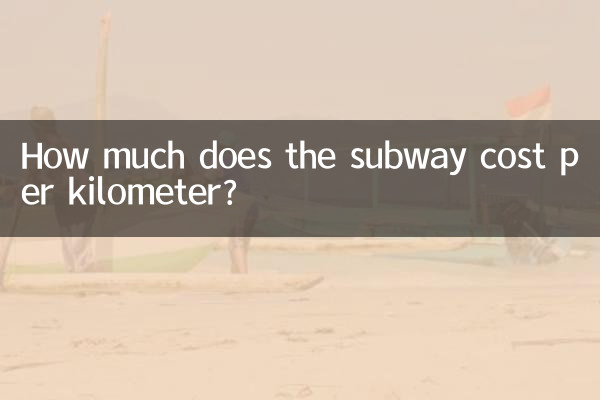How much does one kilometer of subway cost? Hot topics and data analysis on the entire network in the past 10 days
Recently, the issue of subway fares has once again become a hot topic of public discussion. With the rapid development of urban rail transit, the pricing methods, operating costs and subsidy policies of subways in various places have attracted widespread attention. This article will analyze the logic behind subway fares based on hot topics and data from the entire Internet in the past 10 days.
1. Comparison of subway fares in major cities across the country

The following are the subway fare standards for 10 major domestic cities (data source: official websites of various subways and public reports, statistics as of October 2023):
| City | Starting price | Unit price per kilometer (yuan/km) | Maximum fare |
|---|---|---|---|
| Beijing | 3 yuan (within 6km) | 0.50-0.60 | 10 yuan |
| Shanghai | 3 yuan (within 6km) | 0.45-0.55 | 15 yuan |
| Guangzhou | 2 yuan (within 4km) | 0.40-0.50 | 14 yuan |
| Shenzhen | 2 yuan (within 4km) | 0.35-0.45 | 14 yuan |
| Chengdu | 2 yuan (within 4km) | 0.30-0.40 | 10 yuan |
| Wuhan | 2 yuan (within 4km) | 0.25-0.35 | 9 yuan |
| Nanjing | 2 yuan (within 4km) | 0.25-0.30 | 10 yuan |
| Hangzhou | 2 yuan (within 4km) | 0.30-0.40 | 12 yuan |
| Chongqing | 2 yuan (within 6km) | 0.20-0.30 | 10 yuan |
| Xi'an | 2 yuan (within 6km) | 0.20-0.25 | 8 yuan |
2. Analysis of recent hot topics
1.Subway ticket reform: Beijing, Shanghai and other cities have recently discussed the advantages and disadvantages of "price based on mileage" and "price based on range". Some netizens believe that the current fares are unfair to short-distance passengers.
2.Disclosure of operating costs: Shenzhen Metro announced its 2022 financial report, which showed that the operating cost per kilometer reached 120 million yuan, and fare revenue only covered 30% of the cost, triggering discussions on the transparency of financial subsidies.
3.New technology application: Hangzhou, Chengdu and other cities are piloting "face recognition rides", but the balance between fare preferential policies and privacy protection has become a focus of controversy.
4.Special group discounts: Representatives of people's congresses in many places proposed to expand the free riding period for the elderly, which conflicts with the morning peak traffic restriction policy.
3. Horizontal comparison of international subway fares
| city(country) | Unit price per kilometer (equivalent to RMB) | Fare revenue share |
|---|---|---|
| Tokyo (Japan) | 1.8-2.2 yuan | 120% |
| London (UK) | 2.5-3.0 yuan | 90% |
| New York (USA) | 1.5-2.0 yuan | 60% |
| Paris (France) | 1.2-1.5 yuan | 50% |
| Singapore | 1.0-1.3 yuan | 110% |
4. Expert opinions and future trends
1.Dynamic pricing possible: Tsinghua University Transportation Research Institute recommends referring to the electricity price ladder model and appropriately increasing fares during peak hours.
2.cost control needs: Data shows that the domestic subway construction cost per kilometer is 1.5-2 times the international average, and the reform of the fare mechanism needs to be synchronized with cost reduction and efficiency improvement.
3.Diversification: The "track + property" model of the Hong Kong Metro has been adopted by many places, and the proportion of non-ticketing revenue has reached more than 50%.
4.Green travel incentives: The Ministry of Ecology and Environment is studying the inclusion of subway travel in personal carbon accounts, which may be linked to fare discounts in the future.
Conclusion
Subway fares are not only a transportation problem, but also the epitome of urban governance. It can be seen from the data that my country's subway fares are at a low level in the world, but issues such as the sustainability of financial subsidies, improvement of operational efficiency, and social equity still need to be discussed in depth. In the future, with the development of smart transportation, a more refined fare system may emerge, and public participation in the pricing decision-making process is also worth looking forward to.

check the details

check the details